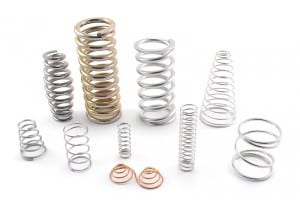 We offer custom compression springs made from a range of materials. In-house CNC spring coilers are used to manufacture precision compression springs with close tolerance spring loads, making them ideal for a multitude of critical applications. From medical devices to mining and drilling equipment, there is a range of industries that rely on these versatile springs. Different spring configurations such as hourglass (concave), barrel (convex), and conical compression springs can be manufactured with our CNC coilers.
We offer custom compression springs made from a range of materials. In-house CNC spring coilers are used to manufacture precision compression springs with close tolerance spring loads, making them ideal for a multitude of critical applications. From medical devices to mining and drilling equipment, there is a range of industries that rely on these versatile springs. Different spring configurations such as hourglass (concave), barrel (convex), and conical compression springs can be manufactured with our CNC coilers.
Available Sizes
Springs are available in wire sizes ranging from 0.005” to 0.250″. Open-ended, close-ended, and combination-ended configurations are available. End grinding services are offered for compression springs with a minimum wire size of 0.018” and outer diameter from 0.060” to 3”. Customers can also choose from our wide range of secondary services, such as passivation of stainless steel, plating, and heat treatment for stress relieving.
Custom Spring Design Services
Our in-house engineering and design department can provide design assistance as well as verify existing spring designs. We accept compression spring designs in a number of file formats, including DWF, DWG, DXF, FBX, JPG, PRT, SAT, TIF, STP, and PDF. Prototype development services are also offered to our customers for product evaluation prior to actual production.
Contact us today and we would be happy to discuss a custom solution to suit your needs.

